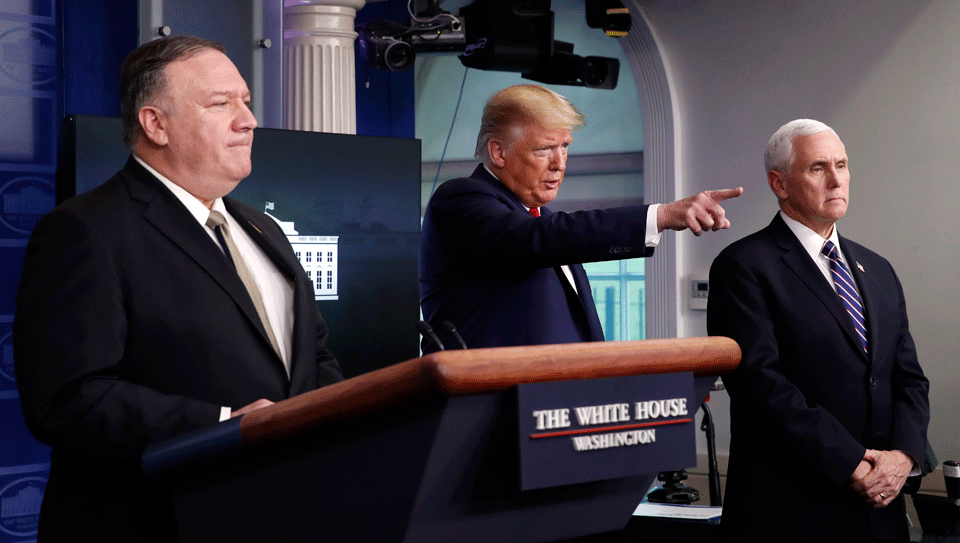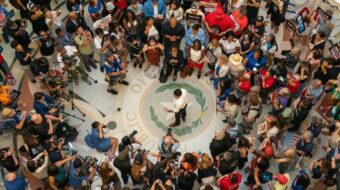
In an interview for CBS in early May, U.S. Secretary of State Mike Pompeo seemed unable to distinguish between conspiracies or science. In almost one breath, the Harvard law graduate told a reporter earlier this month that “enormous evidence” exists to say that the virus that causes COVID-19 is “man made.” He, then, immediately stated, without irony, that he believed U.S. intelligence officials who have flatly rejected that claim.
The Trump administration’s responses to questions such as these are designed to promote confusion rather than clear answers. The contradiction in Pompeo’s answer reflects the divided, disorganized, ill-managed, ill-tempered, and at many times imbecilic leadership in the Trump administration.
Notoriously, Trump refuses necessary medical advice against infectious disease, encouraged Americans to inject disinfectants, and held a prayer meeting to pray away the virus. This volatility has much of the U.S. political establishment clamoring for a significant electoral change this November.
The well-being of the mass of Americans, in fact, depends on the successful transition away from Trump’s rule.
But Pompeo’s remarks reflect another simmering problem in the thought processes dominating the U.S. ruling class these days: to promote hostility toward China. Right-wing commentators are discussing the possibly of “decoupling” with China, while others express far more hostile demands, such as refusing to repay billions in loans from China.
Both of these suggestions appeal to Trump’s base of voters, but would so shock the global capitalist system into chaos that few, even in Trump circles, seriously support either idea. As the Research Unit for Political Economy showed, “dollar hegemony” is premised on belief and fear: fear of U.S military power and a belief that investors will be rewarded for buying U.S. Treasury Bonds, the thin foundation of dollar hegemony. If the U.S. decided to default deliberately, investors would seek safe harbor elsewhere, sending U.S. currency into a death spiral. And the theory that more money could simply be printed, would no longer prove viable.
Feeble Trump attempts to lay blame on China for supposedly manufacturing the virus was the crux of Pompeo’s laughable statements. This shaky theme, articulated by Trump ally Sen. Tom Cotton, who is servant both of Wall Street and Arkansas billionaire Warren Stephens, has become a central feature of the Trump campaign message. Right-wing finance capitalist Warren Stephens gave at least $1 million to a pro-Trump super-PAC and has been added to a growing list of millionaires and billionaires looking to force American workers back to work despite ongoing COVID-19 dangers.
At one of his chaotic media briefings in late April, Trump said, “[I]f [China] were knowingly responsible, yeah, I mean, then sure there should be consequences.” He made this statement just three days before he suggested Americans inject disinfectants as a treatment for COVID-19.
Trump’s despicable intention in making such statements, even as the bulk of the scientific and intelligence community is saying precisely the opposite, is first and foremost a weak attempt to distract from his administration’s incompetence in handling of the pandemic.
Secondly, his aim is to conflate and manage the conspiracy theories, anti-Chinese and anti-Asian racism, and confusion and panic that enthrall his base of supporters. This, even as he begs President Xi for a trade deal, seeks additional purchases of U.S. Treasury bonds to finance a skyrocketing budget and trade deficit, and pleads for continued access to China’s relatively lower-cost workforce to make products for big U.S.-based multinational corporations.
The Trump message unconvincingly suggests that China weaponized a new virus to disrupt the global economy. To accept this offensive implication, one would have to believe that China deliberately killed tens of thousands of its people, risking the stability of its own state and economy.
Aside from the pathetic implausibility of this proposition, here is the problem. Of the two countries in question, only one has actually weaponized disease to commit mass killings as a means of pushing an imperialist agenda.
Only the U.S. military has actually weaponized disease as a military and political strategy. During the 1991 Persian Gulf War, the U.S. military and intelligence community deliberately planned and carried out the destruction of Iraq’s water purification system to induce and spread deadly diseases. The outcome, which led to senseless deaths, wasn’t an accident of war.
Instead, as U.S. government documents declassified as part of the effort to understand “Gulf War Syndrome” in the mid-1990s revealed, it was a deliberate policy of the first Bush administration, according to researchers Graeme MacQueen, Thomas Nagy, Joanna Santa Barbara, and Claudia Raichle in a 2004 article for the academic journal Medicine, Conflict, and Survival.
Further, in the postwar sanctions regime under Clinton and the subsequent Bush administration, U.S. officials intentional blocked the Iraqi government from purchasing chemicals and equipment needed for water purification with the same intention of weaponizing diseases such as cholera, hepatitis, and typhoid to maintain military, political, and economic dominance over that country.
According to research by the late economist Edward Herman, a former professor at the Wharton School, Trump’s alma mater, and journalist David Peterson, as many as 800,000 Iraqis, including an over-abundance of Iraqi children most vulnerable to such diseases, died as a result of this policy between 1991 and 2003. In their book The Politics of Genocide, they reported that the impact of this policy was so glaringly egregious that multiple UN officials responsible for humanitarian aid projects in Iraq resigned in protest.
The U.S. officials who managed the sanctions regime characterized their policies as “smart sanctions.” Such a euphemism exposes just how carefully they considered their choices in the deliberate weaponization of disease prompting massive non-military casualties.
Many of the unpunished perpetrators of this crime against humanity, in the first and second Bush administrations, as well as the Clinton administrations, remain leaders in the political establishment, well-placed academics, major players in the intelligence apparatus, or corporate leaders.
In the present, global concerns persist about the dangers of U.S.-operated biolabs. According to one report, “the U.S. has more than 200 biological laboratories established worldwide and large-scale dangerous infectious diseases have been found around some of them.” The U.S. government controls labs, according to some accounts, in Africa, Eastern Europe, and Southeast Asia.
According to a USA Today investigation in 2015, in the territory of the U.S. alone, “[f]rom 2006 through 2013, labs notified federal regulators of about 1,500 incidents with select agent pathogens and, in more than 800 cases, workers received medical treatment or evaluation, limited public data in program annual reports show.”
Accidents in U.S.-located labs involved anthrax, ebola, flu virus, as well as a variety of pathogens sources wouldn’t discuss. U.S. officials claim the labs are only studying how terrorists might use pathogens or epidemics as weapons.
As the Trump administration propels U.S. international relations into unnecessarily dangerous waters, the American people need instead a serious focus on the battle against the disease. We need a clear and unified response to the pandemic based in science, not pathetic conspiracy or the pure drive for profit.
Instead of confused and contradictory threats, we need a leadership that is invested in coherent health strategies and economic policies that protect working-class people from the onset of disaster. For this, the Trump administration has shown itself to be wholly incapable.










